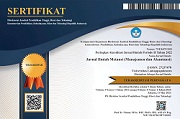Pengaruh Lingkungan Kerja Terhadap Produktivitas Pegawai Pada CV Sukses Karya Lestari Kota Gunungsitoli
Abstract
The work environment encompasses everything around employees while they are working, both in physical and non-physical forms, which can influence them in carrying out their tasks and daily work. A conducive work environment provides a sense of security that enables employees to work optimally. The work environment can affect employees' emotions. If an employee enjoys the work environment where they work, they will feel comfortable in their workplace. A conducive work environment will have a positive impact on the company; conversely, if the work environment is less conducive, it will have a negative impact on the company. The problem formulation in this research is to determine whether there is an Influence of the Work Environment on Employee Productivity at CV. Sukses Karya Lestari, Gunungsitoli City. This research uses quantitative research to determine the influence of an independent variable on the dependent variable in a study and the extent of its role with the aim of testing the established hypotheses. The research sample is the entire population size due to the limited number of respondents studied. From the research results, it is known that the levels of validity of variables X and Y meet the applicable standards with the overall results of the questionnaire items declared valid because r calculated > r table (0.334), at a confidence interval of 95% with N = 35. The research instruments for each variable are also declared reliable with r calculated X (0.495) > r table (0.334) and r calculated Y (0.526) > r table (0.334) at a confidence interval of 95% with N = 35. The calculation of the determination correlation shows that there is an influence of variable X (work environment) on variable Y (employee productivity in the production department) by 23.9%, while 76.1% is influenced by other factors not discussed in this study.
References
Abdurachman, D., Ramdhan, R. M., Karsoma, A., Winarno, A., & Hermana, D. (2023). Integrating Leadership in Job Demand Resources (JD-R) for Personal Performance in Military Institution. Sustainability (Switzerland), 15(5), 1–13. https://doi.org/10.3390/su15054004
Davis, M. C., Unsworth, K. L., Russell, S. V., & Galvan, J. J. (2020). Can green behaviors really be increased for all employees? Trade-offs for “deep greens” in a goal-oriented green human resource management intervention. In Business Strategy and the Environment (Vol. 29, Issue 2). https://doi.org/10.1002/bse.2367
ERBAŞI, A. (2022). Green Organizational Climate: Measurement Scale Development and Validation to Measure Green Climate Structure in Organizations. Ege Akademik Bakis (Ege Academic Review). https://doi.org/10.21121/eab.1086516
Farooq, K., Yusliza, M. Y., Muhammad, Z., & Mat, N. H. N. (2022). Make it their Decisions, not your Directives: Exploring Required Green Competencies for Employee Ecological Behaviour. Organizacija, 55(2), 128–141. https://doi.org/10.2478/orga-2022-0009
Flagstad, I., & Johnsen, S. Å. K. (2022). The psychology of green entrepreneurship: Founder-driven development of green climate in small-scale companies. Cogent Business and Management, 9(1). https://doi.org/10.1080/23311975.2022.2079245
Nuzulia, A. (1967). Tinjauan Literatur Tentang Pengembangan Pembelajaran Dalam Mengimplementasikan Kurikulum 2013 Alfin. Angewandte Chemie International Edition, 6(11), 951–952., 01(01), 5–24.
Purwanto, A., Tukiran, M., Asbari, M., Hyun, C. C., Santoso, P. B., & Wijayanti, L. M. (2020). Model kepemimpinan di lembaga pendidikan: a schematic literature review. Journal of Engineering and Management Science Research (JIEMAR), 1(2), 255–266. https://journals.indexcopernicus.com/search/article?articleId=2660964
Raden Soebiartika, & Ida Rindaningsih. (2023). Systematic Literature Review (SLR): Implementasi Sistim Kompensasi dan Penghargaan Terhadap Kinerja Guru SD Muhammadiyah Sidoarjo. MAMEN: Jurnal Manajemen, 2(1), 171–185. https://doi.org/10.55123/mamen.v2i1.1630
Ren, S., Tang, G., & Zhang, S. (2023). Small Actions Can Make a Big Difference: Voluntary Employee Green Behaviour at Work and Affective Commitment to the Organization. British Journal of Management, 34(1), 72–90. https://doi.org/10.1111/1467-8551.12597
Uddin, M. A., Akter, R., Al-Amin, M., Rahman, M. S., & Ferdausy, S. (2020). How Do Socially Responsible Human Resource Management and Voluntary Green Behavior Influence Organizational Competitiveness? In Studies in Business and Economics (Vol. 15, Issue 2, pp. 243–255). https://doi.org/10.2478/sbe-2020-0038
Waqas, M., Yahya, F., Ahmed, A., Rasool, Y., & Hongbo, L. (2021). Unlocking Employee’s Green Behavior in Fertilizer Industry: The Role of Green HRM Practices and Psychological Ownership. International Food and Agribusiness Management Review, 24(5), 827–843. https://doi.org/10.22434/IFAMR2020.0109














